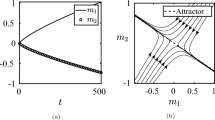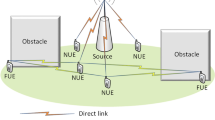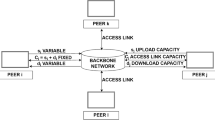Abstract
This paper is concerned with the distributed Nash equilibrium (NE) computation problem for non-cooperative games subject to partial-decision information. For the purpose of congestion mitigation, coding-decoding-based schemes are constructed on the basis of logarithmic and uniform quantizers, respectively. To be specific, the data (decision variable) are first mapped to codewords by an encoder scheme, and then sent to the neighboring agents through a directed communication network (with non-doubly stochastic weighted matrix). By using a decoder scheme, a new distributed algorithm is established for seeking the NE. In order to eliminate the convergence error caused by quantization, a dynamic variable is introduced and a modified coding-decoding-based algorithm is constructed under the uniform quantization scheme, which ensures the asymptotic convergence to the NE. The proposed algorithm only requires that the weighted adjacency matrix is row stochastic instead of double stochastic. Finally, one numerical example is provided to validate the effectiveness of our algorithms.
Similar content being viewed by others
References
Zhao G Y, Li Y T, Xu Q R. From emotion AI to cognitive AI. Int J Net Dyn Intell, 2022, 1: 65–72
Su Y F, Cai H, Huang J. The cooperative output regulation by the distributed observer approach. Int J Net Dyn Intell, 2022, 1: 20–35
Zhong J, Ho D W C, Lu J. A new approach to pinning control of boolean networks. IEEE Trans Control Netw Syst, 2022, 9: 415–426
Zhong J, Yu Z, Li Y, et al. State estimation for probabilistic boolean networks via outputs observation. IEEE Trans Neural Netw Learn Syst, 2022, 33: 4699–4711
Altman E, Basar T, Srikant R. Nash equilibria for combined flow control and routing in networks: Asymptotic behavior for a large number of users. IEEE Trans Automat Contr, 2002, 47: 917–930
Frihauf P, Krstic M, Basar T. Nash equilibrium seeking in noncooperative games. IEEE Trans Automat Contr, 2012, 57: 1192–1207
Tan X G, Yuan Y, He W L, et al. Distributed hybrid optimization for multi-agent systems. Sci China Tech Sci, 2022, 65: 1651–1660
Gadjov D, Pavel L. A passivity-based approach to Nash equilibrium seeking over networks. IEEE Trans Automat Contr, 2019, 64: 1077–1092
Hu A H, Park J H, Cao J D, et al. Event-triggered bipartite consensus over cooperation-competition networks under DoS attacks. Sci China Tech Sci, 2021, 64: 157–168
Ye M, Hu G, Lewis F L. Nash equilibrium seeking for N-coalition non-cooperative games. Automatica, 2018, 95: 266–272
Fu Z, Yu W W, Lu J H, et al. A distributed normalized Nash equilibrium seeking algorithm for power allocation among micro-grids. Sci China Tech Sci, 2021, 64: 341–352
Xu W, Wang Z, Hu G, et al. Hybrid Nash equilibrium seeking under partial-decision information: an adaptive dynamic event-triggered approach. IEEE Trans Automat Contr, 2022, doi: https://doi.org/10.1109/TAC.2022.3226142
Tan S, Fang Z, Wang Y, et al. Consensus-based multipopulation game dynamics for distributed nash equilibria seeking and optimization. IEEE Trans Syst Man Cybern Syst, 2023, 53: 813–823
Cortes A, Martinez S. Self-triggered best-response dynamics for continuous Games. IEEE Trans Automat Contr, 2015, 60: 1115–1120
Yang S, Wang J, Liu Q. Cooperative-competitive multiagent systems for distributed minimax optimization subject to bounded constraints. IEEE Trans Automat Contr, 2019, 64: 1358–1372
Leung M F, Wang J, Li D. Decentralized robust portfolio optimization based on cooperative-competitive multiagent systems. IEEE Trans Cybern, 2022, 52: 12785–12794
Yuan Y, Wang Z, Guo L. Event-triggered strategy design for discrete-time nonlinear quadratic games with disturbance compensations: The noncooperative case. IEEE Trans Syst Man Cybern Syst, 2018, 48: 1885–1896
Bianchi M, Grammatico S. Nash equilibrium seeking under partial-decision information over directed communication networks. In: Proceedings of the 2020 59th IEEE Conference on Decision and Control (CDC). IEEE, 2020. 3555–3560
Zhang P, Yuan Y, Liu H, et al. Nash equilibrium seeking for graphic games with dynamic event-triggered mechanism. IEEE Trans Cybern, 2022, 52: 12604–12611
De Persis C, Grammatico S. Distributed averaging integral Nash equilibrium seeking on networks. Automatica, 2019, 110: 108548
Lu K, Jing G, Wang L. Distributed algorithms for searching generalized Nash equilibrium of noncooperative games. IEEE Trans Cybern, 2019, 49: 2362–2371
Xu W, He W, Ho D W C, et al. Fully distributed observer-based consensus protocol: Adaptive dynamic event-triggered schemes. Automatica, 2022, 139: 110188
Li X, Yi X, Xie L. Distributed online optimization for multi-agent networks with coupled inequality constraints. IEEE Trans Automat Contr, 2021, 66: 3575–3591
Li T, Fu M, Xie L, et al. Distributed consensus with limited communication data rate. IEEE Trans Automat Contr, 2011, 56: 279–292
Liu S, Li T, Xie L. Distributed consensus for multiagent systems with communication delays and limited data rate. SIAM J Control Optim, 2011, 49: 2239–2262
Zhang Q, Zhang J F. Quantized data-based distributed consensus under directed time-varying communication topology. SIAM J Control Optim, 2013, 51: 332–352
Li H, Chen G, Huang T, et al. Event-triggered distributed average consensus over directed digital networks with limited communication bandwidth. IEEE Trans Cybern, 2016, 46: 3098–3110
Suo J, Li N. Observer-based synchronisation control for discrete-time delayed switched complex networks with coding-decoding approach. Int J Syst Sci, 2022, 53: 2711–2728
Yang F, Li J, Dong H, et al. Proportional-integral-type estimator design for delayed recurrent neural networks under encoding-decoding mechanism. Int J Syst Sci, 2022, 53: 2729–2741
Wang L, Wang Z, Wei G, et al. Observer-based consensus control for discrete-time multiagent systems with coding-decoding communication protocol. IEEE Trans Cybern, 2019, 49: 4335–4345
Rao X P, Xu W Y. Fully distributed Nash equilibrium seeking algorithm with quantization effects in a directed graph. In: Proceedings of 2021 5th Chinese Conference on Swarm Intelligence and Cooperative Control. Lecture Notes in Electrical Engineering. Singapore: Springer, 2021
Liu S, Li T, Xie L, et al. Continuous-time and sampled-data-based average consensus with logarithmic quantizers. Automatica, 2013, 49: 3329–3336
Xu W, Ho D W C, Zhong J, et al. Distributed edge event-triggered consensus protocol of multi-agent systems with communication buffer. Int J Robust Nonlinear Control, 2017, 27: 483–496
Yang X S, Cao J D, Xu C, et al. Finite-time stabilization of switched dynamical networks with quantized couplings via quantized controller. Sci China Tech Sci, 2018, 61: 299–308
Carli R, Fagnani F, Frasca P, et al. Gossip consensus algorithms via quantized communication. Automatica, 2010, 46: 70–80
Lei J, Yi P, Shi G, et al. Distributed algorithms with finite data rates that solve linear equations. SIAM J Optim, 2020, 30: 1191–1222
Fu M Y, Xie L H. Finite-level quantized feedback control for linear systems. IEEE Trans Automat Contr, 2009, 54: 1165–1170
Yi P, Hong Y. Quantized subgradient algorithm and data-rate analysis for distributed optimization. IEEE Trans Control Netw Syst, 2014, 1: 380–392
Li H, Liu S, Soh Y C, et al. Event-triggered communication and data rate constraint for distributed optimization of multiagent systems. IEEE Trans Syst Man Cybern Syst, 2018, 48: 1908–1919
Chen Z, Ji H. Distributed quantized optimization design of continuous-time multiagent systems over switching graphs. IEEE Trans Syst Man Cybern Syst, 2021, 51: 7152–7163
Li H, Huang C, Chen G, et al. Distributed consensus optimization in multiagent networks with time-varying directed topologies and quantized communication. IEEE Trans Cybern, 2017, 47: 2044–2057
Yuan D, Zhang B, Ho D W C, et al. Distributed online bandit optimization under random quantization. Automatica, 2022, 146: 110590
Nekouei E, Nair G N, Alpcan T. Performance analysis of gradient-based nash seeking algorithms under quantization. IEEE Trans Automat Contr, 2016, 61: 3771–3783
Chen Z, Ma J, Liang S, et al. Distributed Nash equilibrium seeking under quantization communication. Automatica, 2022, 141: 110318
Ye M, Han Q L, Ding L, et al. Distributed Nash equilibrium seeking strategies under quantized communication. IEEE CAA J Autom Sin, 2022
Barker G P, Schneider H. Algebraic perron-frobenius theory. Linear Algebra its Appl, 1975, 11: 219–233
Facchinei F, Pang J S. Finite-Dimensional Variational Inequalities and Complementarity Problems. New York: Spinger, 2007
Bianchi M, Grammatico S. A continuous-time distributed generalized Nash equilibrium seeking algorithm over networks for doubleintegrator agents. In: Proceedings of the 2020 European Control Conference (ECC). St. Petersburg, 2020
Elia N, Mitter S K. Stabilization of linear systems with limited information. IEEE Trans Automat Contr, 2001, 46: 1384–1400
Widrow B, Kollar I, Ming-Chang Liu I. Statistical theory of quantization. IEEE Trans Instrum Meas, 1996, 45: 353–361
Stankovic M S, Johansson K H, Stipanovic D M. Distributed seeking of Nash equilibria with applications to mobile sensor networks. IEEE Trans Automat Contr, 2012, 57: 904–919
Wang P J, Yu W W, Wen G H, et al. A chattering free consensus controller for multiple Lur’e systems with a non-autonomous leader and directed switching topology. Sci China Tech Sci, 2023, 66: 1110–1118
Wang X L, Sun Y, Ding D. Adaptive dynamic programming for networked control systems under communication constraints: A survey of trends and techniques. Int J Netw Dyn Intell, 2022, 1: 85–98
Deng C, Wen C, Wang W, et al. Distributed adaptive tracking control for high-order nonlinear multiagent systems over event-triggered communication. IEEE Trans Automat Contr, 2023, 68: 1176–1183
Wang X X, Liu Z X, Chen Z Q. Event-triggered fault-tolerant consensus control with control allocation in leader-following multi-agent systems. Sci China Tech Sci, 2021, 64: 879–889
Deng C, Zhang D, Feng G. Resilient practical cooperative output regulation for MASs with unknown switching exosystem dynamics under DoS attacks. Automatica, 2022, 139: 110172
Xu W, Ho D W C, Zhong J, et al. Event/self-triggered control for leader-following consensus over unreliable network with DoS attacks. IEEE Trans Neural Netw Learn Syst, 2019, 30: 3137–3149
Ma H, Li H, Lu R, et al. Adaptive event-triggered control for a class of nonlinear systems with periodic disturbances. Sci China Inf Sci, 2020, 63: 150212
Author information
Authors and Affiliations
Corresponding author
Additional information
This work was supported by the National Natural Science Foundation of China (Grant Nos. 62173087, 62233004, 62176056, and 62073076), the Young Elite Scientists Sponsorship Program by CAST (Grant No. 2021QNRC001), the Fundamental Research Funds for the Central Universities, and the Alexander von Humboldt Foundation of Germany. This work was also supported by ZhiShan Youth Scholar Program from Southeast University.
Rights and permissions
About this article
Cite this article
Rao, X., Xu, W., Yang, S. et al. A distributed coding-decoding-based Nash equilibrium seeking algorithm over directed communication network. Sci. China Technol. Sci. 66, 1975–1986 (2023). https://doi.org/10.1007/s11431-022-2333-3
Received:
Accepted:
Published:
Issue Date:
DOI: https://doi.org/10.1007/s11431-022-2333-3




